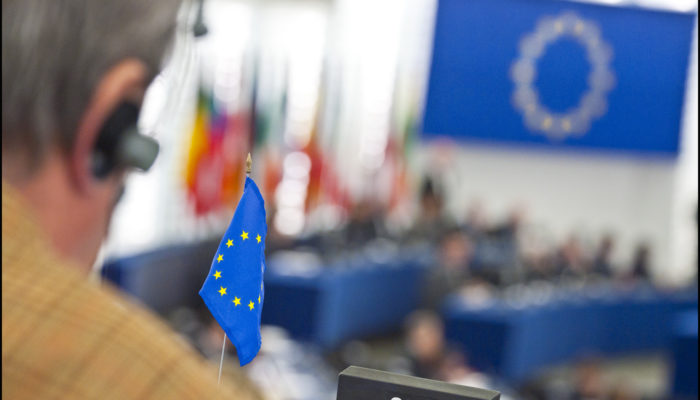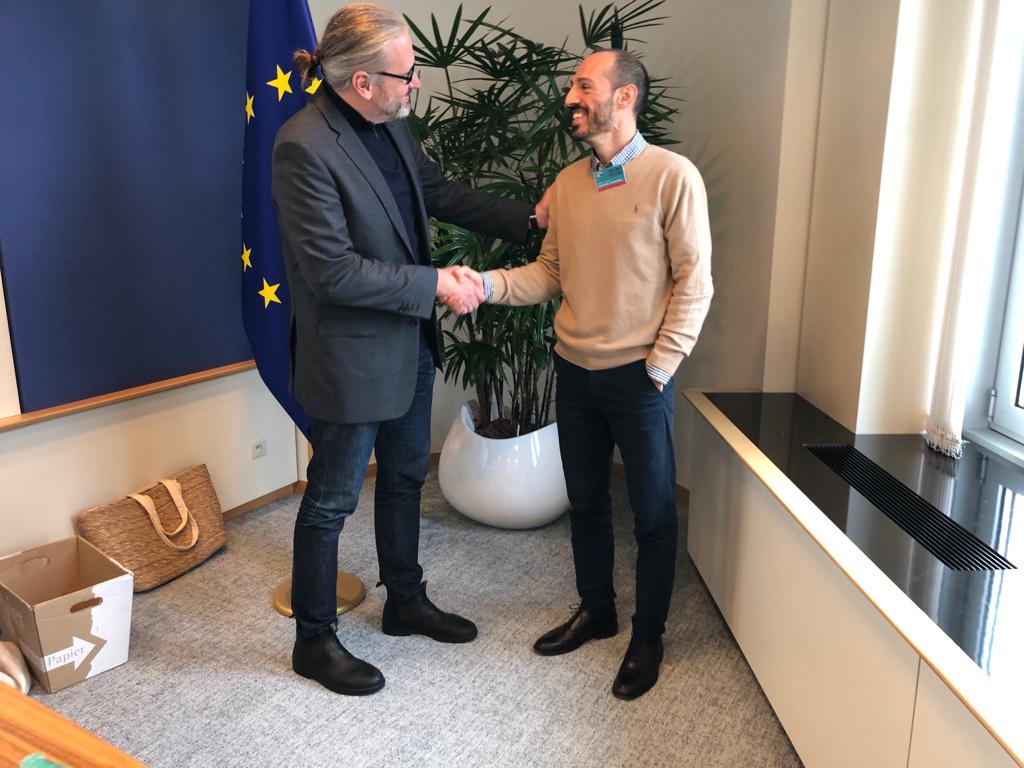
Internships and traineeships are a great way to gain a better understanding of the political system and how policymakers use scientific evidence! This month’s GeoPolicy Blog post highlights various European-based opportunities that researchers can apply for.
Understanding Europe’s political landscape and the information that policymakers need to make evidence-informed decisions is one of the most challenging aspects of providing useful science advice. From the outside, it can be difficult to understand the procedures and nuances of the policy world! Getting an insider’s perspective on the policymaking process can be a great way for researchers to gain better political insight and understand what information is likely to be useful to those in decision-making positions. Internships and traineeships not only offer this insider view, but may also lead to other opportunities on the science-policy interface, from network expansion to job prospects! This month’s GeoPolicy Blog post will provide you with a list of these opportunities in Europe – including schemes that last just a few weeks and/or allow the researcher to continue in their current position, to those that are full time positions for up to half a year. All of the positions listed below provide a salary or stipend unless otherwise stated.
Please note that this is an incomplete list! We will continue to edit and add to it as time goes on. If you know of a science for policy opportunity that isn’t yet listed, please share it with us in the comment section below!
Opportunities within the European Commission
The European Commission is the executive branch of the European Union, responsible for proposing legislation, implementing decisions, and ensuring the EU’s policies and laws are effective. It is organised into different Directorates-Generals, Services, and Executive Agencies that oversee specific policy areas.
The European Blue Book Traineeship
The European Commission’s 5-month Blue Book Traineeship programme will provide insight into what life is like inside the Commission and how information is provided and used by policymakers. Some examples of activities that you may undertake as a Blue Book Trainee include: attending and organising meetings, conducting research, drafting and editing policy documents, and answering enquiries. Because Blue Book Trainees work across the various areas of the Commission, there are many different topics that candidates can opt to apply. While the Commission doesn’t specifically target scientists in the application process, having a PhD is often seen as being advantageous.
The European Commission Joint Research Centre’s Scientific Traineeships
The Joint Research Centre (JRC) of the European Commission has an open call for 3-5 month Scientific Traineeships twice per year. The JRC functions as the Commission’s in-house science and knowledge service provider, employing scientists to provide independent scientific advice and support to EU policy. As a result, JRC traineeships provide a fantastic opportunity for scientists to gain a better understanding of how policy institutes operate, what current and upcoming issues are, and how to effectively communicate science with a policy audience. You can also read some personal insights and experiences from a former JRC Trainee here to learn more about their traineeship programme.
Opportunities within the European Parliament
The European Parliament, together with the Council, is the EU’s law-making body that is responsible for amending and either passing or rejecting proposed legislation from the European Commission. It is directly elected by EU voters every 5 years.
The European Parliament’s Robert Schuman Traineeship
Schuman traineeships are open to all European graduates and early career professionals. They provide successful applicants with an introduction to the European Parliament and a wide range of different topics depending on the legislative files that are being processed. Work inside the Parliament is action packed with many different policies being discussed at any one time, so trainees are likely to experience many different topics and procedures during their time inside the Parliament.
Internships with the European Parliamentary Intergroups
European Parliamentary Intergroups provide a forum for informal exchanges of views on specific issues across different political groups within the Parliament. While they are not official Parliament bodies, they are recognised by Parliament, and each is composed of Members of the European Parliament from at least three different political groups. There are a wide variety of Intergroups that cover various topics. Some of these Intergroups, such as the European Parliamentary Intergroup on Climate Change, Biodiversity and Sustainable Development, openly advertise for Interns while others may be open to unsolicited applications.
Internships within individual MEP offices
Many of the 705 Members of the European Parliament (MEPs) are also open to hosting interns or trainees within their office on an ad hoc basis. Individual MEPs may advertise these positions on their own websites or they may be open to unsolicited applications. If there’s an MEP that you follow or are particularly interested in from your home country, it might be worth sending them an email to ask! You can gain some insights into what your experience might be like working with an MEP inside the Parliament in this blog post by Accredited Parliamentary Assistant, Sebastian Jehle.
The Council of the European Union
The Council, together with the Parliament, is jointly responsible for amending and adopting policies proposed by the European Commission. The Council meets in 10 different configurations of 27 national ministers (one per Member State).
Council Traineeships
Twice a year, the Council offers 5-month paid traineeships in Brussels for up to a total of 100 applicants. As a trainee, you will be working in one of the teams of the General Secretariat of the Council and tasks may include preparing meetings and drafting minutes, carrying out research for a particular project, and supporting EU and international conferences and summits. Applications are open twice a year: in February for traineeships starting in September and in September for traineeships starting in February of the following year.
Inter-institutional opportunities
While each of the above policy institutions host their own internship and traineeship programmes, there are also opportunities that bridge all three of them.
European Committee of the Regions Traineeship programme
The European Commission’s Committee of the Regions is an EU advisory body composed of locally and regionally elected representatives coming from all 27 Member States. It gives regions and cities a formal say in EU law-making with the European Commission, the Council, and the European Parliament obliged to consult them whenever legislative matters will impact local and regional areas. This institution offers two different placements that might be of interest to researchers who are more interested in engaging on a local level: a 5-month Traineeship and Short-Term, unpaid Study Visit (30 days to six months).
Seconded National Experts
Those who are working within public administrations within EU Member States are also able to become a Seconded National Expert for a temporary period. Secondment opportunities can be found across the EU institutions and enable the experts involved to share their unique skills and knowledge for a set period of time while remaining in the service of their national employer. Seconded experts continue to be paid by their national employer while also receiving a daily subsistence allowance from the EU institutions that they’re seconded by. Secondment opportunities can be found on the on the European Personnel Selection Officer (EPSO) job vacancies website. As these positions vary significantly, it’s best to look at specific vacancy advertisements to get a better understanding about the specific selection process, conditions of the secondment, eligibility criteria and remit.
MSCA Postdoctoral Fellowships can also support these secondment opportunities. You may be able to find out more information through a Joint Research Centre, DG Education, Youth, Sport and Culture, and European Research Executive Agency supported Matchmaking event.
Opportunities outside of EU policy institutions
While EU policy institutions obviously have a wide range of opportunities for scientists to engage with, there are many others that are offered by European scientific organisations, institutions, and agencies. Below is a short list of some of the opportunities offered in Europe.
The Institute for European Environmental Policy
The Institute for European Environmental Policy works with stakeholders across EU institutions, international bodies, academia, civil society and industry to produce evidence-based research to help guide policy decisions. They work on many policy-related areas that are likely to be of interest to geoscientists including: biodiversity and ecosystems, the Common Agricultural Policy and food, the Sustainable Development Goals, land use and climate, and climate and circular economy. The Institute for European Environmental Policy regularly hosts interns and welcomes unsolicited applications.
The International Science Council
The International Science Council aims to catalyse scientific expertise and science advice, and influence issues of major concern to both the science community and society. While it’s an international organisation, they have institutional members in Europe and can offer insights into the policymaking world through their various initiatives. The International Science Council regularly hosts calls for interns which you can view here.
The EU Tech Policy Fellowship
The EU Tech Policy Fellowship is a 7-month programme that empowers ambitious graduates to launch European policy careers focused on emerging technology. While this fellowship isn’t exclusively for scientists, it could be a great opportunity for those in the scientific community to gain professional experience in a policymaking setting.
The Centre for European Policy Studies
The Centre for European Policy Studies is a think tank and forum that focuses on EU affairs. It has a in-house research capacity and, together with its network of partner institutes, aims to provide information to decision-making bodies. It regularly offers internship positions which are advertised here that guide participants through policy-orientated research that can then be used to inform upcoming EU decisions.
We hope that this list is useful to those who are looking to learn more about the science-policy interface or transition into a career that focuses on evidence-informed policymaking! If you know of relevant internship and traineeship opportunities that are not included in this blog post, please comment below (or email policy@egu.eu) so that we can add them to our list.





